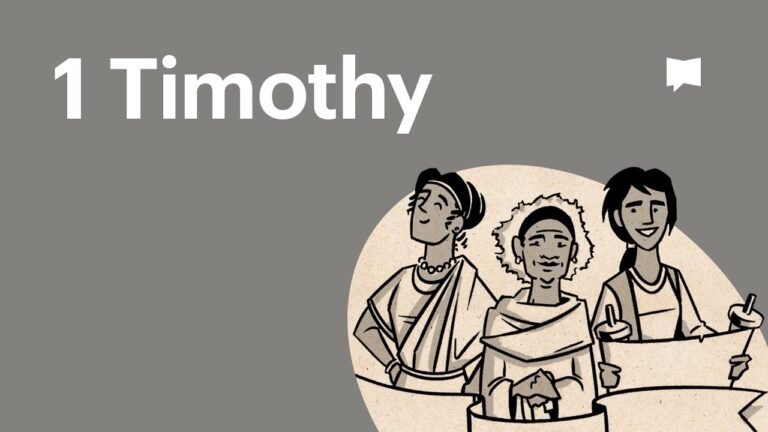The Significance of Timothy in the Bible
Timothy in the Bible stands as a remarkable figure whose life and teachings continue to inspire countless believers. As a close companion and mentee of the Apostle Paul, Timothy played a pivotal role in the early Christian church, embodying the principles of faith, leadership, and perseverance. His letters, rich with guidance and encouragement, offer profound insights into the challenges of spiritual growth and community building. Exploring Timothy’s journey not only illuminates the historical context of the New Testament but also serves as a timeless reminder of the power of mentorship and the importance of steadfast faith.
What actions did Timothy take in the Bible?
Timothy played a vital role in the early Christian church as a trusted companion of the Apostle Paul. His dedication to nurturing faith and guiding new believers made him an indispensable asset to the growing Christian community. Paul often relied on Timothy’s abilities, sending him to various churches to provide support and encouragement, ensuring that the teachings of Jesus were upheld and expanded.
Throughout their partnership, Timothy not only assisted Paul in writing letters to different congregations but also grew in his own leadership abilities. His commitment to caring for others and sharing the message of Christ helped establish strong foundations for the churches he served. Timothy’s influence extended beyond mere assistance; he became a key figure in shaping the faith of many individuals.
In the latter years of Paul’s life, the dynamic shifted as Timothy emerged not only as a helper but as a recipient of Paul’s mentorship. The letters Paul wrote to Timothy reflected his guidance and encouragement, underscoring Timothy’s importance in the early church. By the end of their journey together, Timothy had transitioned into a leader in his own right, continuing the mission of spreading the Gospel and caring for the community of believers.
What is the primary lesson taught in the book of Timothy?
In his Second Epistle to Timothy, Paul imparts essential wisdom about courage and conviction in faith, emphasizing that fear is not a divine sentiment. He urges Timothy to stand boldly in his testimony of Jesus Christ, unashamed despite the challenges he may face. Paul’s encouragement to endure trials and to guide the Saints toward repentance serves as a powerful reminder of the strength found in unwavering belief and the importance of nurturing a resilient community of faith.
What gift did God give to Timothy?
Timothy received a remarkable gift from God, notably the gift of teaching, which played a importante role in his ministry. This divine gift was not just an innate talent but a special calling, emphasized through the laying on of hands by the presbytery. This act symbolized the church’s recognition of Timothy’s unique abilities and the spiritual empowerment he received to fulfill his mission.
The Apostle Paul underscored the importance of this gift, urging Timothy to nurture and develop it rather than allowing it to lie dormant. By encouraging him to “fan it into flames,” Paul highlighted the responsibility that comes with such a gift; it requires dedication, practice, and a commitment to growth. Timothy’s teaching gift was not merely for personal gain but a vital tool for the edification of the church and the spread of the Gospel.
In essence, Timothy’s divine gift of teaching is a profound reminder of the importance of utilizing our unique abilities for a higher purpose. It calls on all believers to recognize and cultivate their own gifts, fostering a vibrant community that thrives on shared wisdom and knowledge. As Timothy exemplified, embracing and enhancing these gifts can lead to transformative experiences both for the individual and the wider faith community.
Unveiling Timothy’s Role in Early Christianity
Timothy emerges as a pivotal figure in the early Christian community, serving as a trusted companion and protégé of the Apostle Paul. His journey began in Lystra, where he was introduced to the teachings of Christ by his mother, Eunice, and grandmother, Lois. This strong foundation in faith equipped Timothy to become a vital link between diverse congregations, bridging Jewish traditions and Gentile beliefs. Paul’s letters frequently highlight Timothy’s dedication and character, portraying him as a model of faithfulness in a rapidly evolving religious landscape.
As Paul’s emissary, Timothy played a importante role in establishing and nurturing several early churches. His presence was instrumental in cities like Corinth and Philippi, where he provided guidance and encouragement to fledgling communities. Paul entrusted him with significant responsibilities, reflecting not only his trust but also Timothy’s ability to articulate and embody the teachings of Christ. The letters addressed to Timothy emphasize his leadership qualities and the importance of sound doctrine, illustrating his influence in shaping early Christian theology.
Timothy’s legacy extends beyond his immediate contributions; he symbolizes the collaborative spirit of early Christianity. His dual heritage as a Jew and a Greek allowed him to navigate and unite different cultural contexts, making him an effective minister of the Gospel. As the early church faced challenges and opposition, Timothy’s unwavering commitment to his mission inspired many to persevere in their faith. Through his example, Timothy invites modern believers to embrace their unique roles in fostering unity and understanding within diverse communities.
Lessons from Timothy: A Guide for Faithful Living
Timothy’s journey in faith serves as a powerful reminder of the strength found in steadfast dedication and mentorship. As a young leader in the early church, Timothy exemplified the importance of nurturing relationships and seeking guidance from seasoned mentors like Paul. His story encourages us to embrace the wisdom of those who have walked the path before us, reminding us that faith is often a communal journey enriched by shared experiences and teachings.
Moreover, Timothy’s unwavering commitment to his beliefs highlights the significance of resilience in the face of challenges. He faced opposition and uncertainty, yet he remained devoted to his mission, encouraging others to do the same. This teaches us that faithful living requires courage and perseverance, urging us to stand firm in our convictions even when the road becomes difficult. By embodying these principles, we can cultivate a life marked by purpose, community, and unwavering faith.
Timothy: The Bridge Between Paul and the Early Church
Timothy emerged as a vital figure in the early Christian church, serving as a trusted companion and key collaborator of the Apostle Paul. His unique position allowed him to bridge the gap between the foundational teachings of Paul and the diverse, emerging communities of believers. With a deep commitment to spreading the Gospel, Timothy traveled extensively with Paul, helping to establish churches and nurture new congregations. His youthful zeal and dedication provided a refreshing perspective, enabling him to connect with both seasoned leaders and new converts alike.
As a leader in his own right, Timothy exemplified the qualities of faithfulness, integrity, and resilience. Appointed as the pastor of the church in Ephesus, he faced the challenges of guiding a growing flock amidst cultural tensions and doctrinal disputes. Paul’s letters to Timothy not only offered encouragement and guidance but also underscored the importance of mentorship and discipleship in sustaining the church’s mission. Through his unwavering support of Paul and his steadfast leadership, Timothy played an essential role in shaping the early Christian movement, ensuring its teachings resonated across generations.
Timothy in the Bible stands as a testament to the transformative power of mentorship and faith. His journey from a young disciple to a pivotal leader in the early church highlights the significance of guidance and dedication in spiritual growth. As we reflect on Timothy’s life and teachings, we are reminded of the enduring impact that one individual can have on the faith community, inspiring us to nurture the next generation of believers with wisdom and love.






